|
|
|
Sort Order |
|
|
|
Items / Page
|
|
|
|
|
|
|
| Srl | Item |
| 1 |
ID:
089211
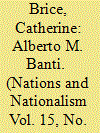

|
|
|
|
|
| Publication |
2009.
|
| Summary/Abstract |
In the light of certain criticisms made of Alberto Banti's work (Mazzonis 2002: Beales and Biagini 2002), it may seem strange to defend him by calling him a historian of politics (even in spite of himself).
|
|
|
|
|
|
|
|
|
|
|
|
|
|
|
|
| 2 |
ID:
089203
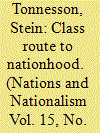

|
|
|
|
|
| Publication |
2009.
|
| Summary/Abstract |
This essay explores the proposition that China and Vietnam represent a fourth class route to modern nationhood, in addition to the ethnic (German), civic (French) and plural (American) routes. Nation-states emerging along the class route are characterised by an exclusive membership based on social class rather than just ethnicity, living under the same laws or participation in liberation from foreign rule. The essay compares China's and Vietnam's class-based nationalism with the more inclusive labour movement nationalisms of Norway and Cyprus. Then it explains how the class route differs from the French civic route. In the conclusion, the author concedes that the Chinese and Vietnamese class route is perhaps a detour rather than a route of its own, since it leads to inevitable tension between the divisive history of how the nation was formed and the need of its later leaders to include and represent the same social classes that were originally excluded. These leaders and their national storytellers are forced to undertake a redefinition of the national self as ethnic, civic and/or plural in an attempt to recreate national legitimacy, often in competition with more radically nationalist opposition groups.
|
|
|
|
|
|
|
|
|
|
|
|
|
|
|
|
| 3 |
ID:
089201
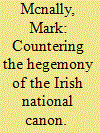

|
|
|
|
|
| Publication |
2009.
|
| Summary/Abstract |
The telling and re-telling of national history has long been recognised in studies of nationalism as one of its key legitimising and mobilising strategies. In this article I illustrate how a rhetorical approach can effectively explore this dynamic and emotive dimension of nationalist ideology by examining the rhetorical strategies in the Irish liberal intellectual, Seán O'Faoláin's, attempts to reconstitute the popular canon of Irish history in the 1930s and 1940s. More specifically, I show that contrary to depictions of O'Faoláin as a European liberal who employed rational argument to undermine and encourage the rejection of Irish nationalism and its emphasis on rhetorical narratives of the past, O'Faoláin's challenge to the Irish national canon reveals that he himself mobilised historical narrative to promote his own modernist version of Irish liberal nationalism and demonstrated in the process that he was one of the most skilful rhetors of his day.
|
|
|
|
|
|
|
|
|
|
|
|
|
|
|
|
| 4 |
ID:
089208
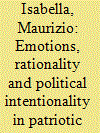

|
|
|
|
|
| Publication |
2009.
|
| Summary/Abstract |
The procedures by which Alberto Banti defines the Risorgimento as a construction founded in the main upon deep images linked to the emotive and symbolic sphere raise question of the utmost importance regarding the very nature of Italian nationalism.
|
|
|
|
|
|
|
|
|
|
|
|
|
|
|
|
| 5 |
ID:
089205


|
|
|
|
|
| Publication |
2009.
|
| Summary/Abstract |
The unification of Italy between 1859 and 1861 was a great victory for European nationalism. To many contempraries, the formation of an Italian nation-state seemed proof that the future of Europe lay with nations, while the largely unexpected.
|
|
|
|
|
|
|
|
|
|
|
|
|
|
|
|
| 6 |
ID:
089212
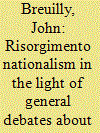

|
|
|
|
|
| Publication |
2009.
|
| Summary/Abstract |
This discussion of Alberto Banti's work on Risorgimento nationalism raises important theoretical and conceptual questions about nationalism generally. Banti is well aware of these questions but comments on them principally to clarify his own approach. Here they are my central concern.
|
|
|
|
|
|
|
|
|
|
|
|
|
|
|
|
| 7 |
ID:
089200


|
|
|
|
|
| Publication |
2009.
|
| Summary/Abstract |
This article identifies several theoretical approaches to the role of culture in the construction of national identity. Embedded in the presently emerging approach, which emphasises the relations between popular culture/consumerism and national identity, this study focuses on a specific consumer good manufactured in Israel in the early 2000s, the height of the second Palestinian Intifada (uprising): small sugar packets bearing portraits of the patriarchs of Zionism. The analysis of this product, employing semiotic analysis, interviews and focus groups, locates it in the five 'moments' of du Gay's 'circuit of culture' (i.e. identity, representation, production, consumption and regulation). Three main general arguments were stated, empirically examined and largely sustained: (1) Consumer goods are used not only for constructing national identity but also as a means for 'healing' it; (2) in their 'healing' capacity, representations of nationalism on consumer goods do not add new elements to representations offered by the 'high' official version of nationalism but replicate them in a simplified way; (3) while trivialising the insights and concepts that originated in 'high' culture, consumer goods expose the prejudices, stereotypes and rules of inclusion and exclusion that in 'high' culture are often hidden in a sophisticated manner.
|
|
|
|
|
|
|
|
|
|
|
|
|
|
|
|
| 8 |
ID:
089198
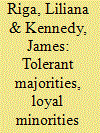

|
|
|
|
|
| Publication |
2009.
|
| Summary/Abstract |
The 1919 Versailles Peace Conference created new states in East Central Europe (ECE), but the imperfect implementation of the 'one nation, one state' formula resulted in more than twenty-five million 'unassimilable' minorities. With the introduction of majoritarian democracy, this gave rise to what we term 'ethnic reversals': 'formally dominant majorities' suffered status decline, while previously 'minoritised majorities' found new political powers. Accordingly, the 1919 Minorities Treaties sought to manage these 'ethnic reversals' by instituting a liberal minority rights regime that tried to create both 'tolerant majorities' and 'loyal minorities'. While the Treaties reflected the influences of Anglo-American and Anglo-American Jewish elites - the most notable voices of liberalism in an age of ethnic homogenisation - we suggest that in contexts of historical diversity with little institutionalised liberalism, 'ethnic reversals' raise issues that cannot be resolved within liberal conceptions of minority rights that rely solely or primarily on cultural protections.
|
|
|
|
|
|
|
|
|
|
|
|
|
|
|
|
| 9 |
ID:
089199


|
|
|
|
|
| Publication |
2009.
|
| Summary/Abstract |
This paper contextualises a political alliance between Ukrainian and Jewish national activists in Austrian Galicia during the 1907 parliamentary elections, Austria's first elections with universal manhood suffrage. This alliance represented a milestone in the making of a new paradigm of Ukrainian-Jewish relations. Ironically, the Ukrainian and Jewish nationalists, portrayed elsewhere as staunch enemies, were uniquely able to overcome the profound social, religious, political, and cultural barriers separating the two communities. Ukrainian nationalists recognised the potential of a nationalised Jewish community to undermine Polish hegemony in Galicia, while some Zionists saw the potential to elect Jewish parliamentary representatives in rural Ukrainian districts where Poles and Jews competed for the districts' second mandate. The alliance mobilised the Ukrainian and Jewish electorate around shared slogans and goals. It was a qualified success, leading to a more powerful national Ukrainian faction as well as the first Zionist faction in any European parliament. Although the two sides failed to repeat the alliance in the subsequent elections in 1911, the coalition sparked a new sense of history for both communities. It created a pro-Ukrainian discourse in Jewish politics, and a pro-Zionist one in Ukrainian politics. The alliance also exposes Zionism as a response to the European-wide nationalist revivalism rather than a reaction to rampant turn-of-the-century racial anti-Semitism.
|
|
|
|
|
|
|
|
|
|
|
|
|
|
|
|
| 10 |
ID:
089207


|
|
|
|
|
| Publication |
2009.
|
| Summary/Abstract |
Central to the thesis of Alberto Banti's La nazione del Risorgimento is his notion that there existed in nineteenth-century Italy a canone risorgimentale, a body of texts-novels, poetry, histories,political treatises, plays, memoirs and operas-published between 1801 and 1849 (Banti 2000a: 3-55).
|
|
|
|
|
|
|
|
|
|
|
|
|
|
|
|
|
|
|
|
|